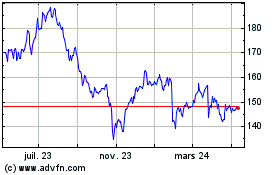On-Demand Warehouse Space Gains Traction in Tight Real-Estate Market
23 Décembre 2018 - 3:29PM
Dow Jones News
By Jennifer Smith
Some big retailers are looking to become as flexible as
short-term apartment renters when it comes to managing
warehouses.
This holiday season, Walmart Inc. used Flexe Inc., a
Seattle-based marketplace that connects warehouse operators with
businesses in need of storage, to secure about 1.5 million square
feet of temporary space to handle the mounting demands of
e-commerce fulfillment.
The warehouse operators that Walmart found through the platform
handle hiring and other administrative tasks for the pop-up spots,
spread out across three facilities in Pennsylvania, Illinois and
Nevada, and Walmart avoids paying year-round for space it would
only use during peak season.
Known as on-demand warehousing, the idea is to tap into unused
space in a crowded U.S. industrial real-estate market where
distribution centers near population centers are fetching a growing
price premium. Retailers and manufacturers are trying to position
goods closer to customers without getting locked into long-term
contracts or multiyear leases when rapid changes in buying patterns
and trade conditions have made forecasting demand more
difficult.
Walmart's biggest volumes come from Thanksgiving to Christmas,
Justin Schuhardt, senior director of operations for Walmart
e-commerce, said at an industry conference earlier this year. "You
don't always want to build the church for Easter."
Flexible warehousing startups often pitch their services as a
way for midsize retailers and online startups to compete with
Amazon.com Inc. without having to build their own distribution
networks.
But larger companies are taking an interest, including those
with established logistics operations.
Retailers and manufacturers are using such pay-as-you go
arrangements to cope with everything from hurricanes to global
trade tensions. Ace Hardware Corp., for example, used Flexe to
stage generators and other disaster-relief items during the 2018
hurricane season after scrambling last year to get supplies to
regions damaged by Hurricanes Harvey and Irma.
The interest comes as growing e-commerce sales sharpen
competition for warehouse space and push up prices. The industrial
availability rate fell to 7.1% in the third quarter, its lowest
since 2000, according to real-estate brokerage firm CBRE Group
Inc.
Companies don't want to commit to multiyear contracts "without
knowing how consumer demand is going to shake out," said Adam
Mullen, who leads CBRE's industrial and logistics business for the
Americas. "They know they are going to see peaks and valleys, and
they're tired of making investments over the whole year."
The strategy is also a way to address the uncertainty from
global trade tensions. Stord Inc., an Atlanta startup with a
network of more than 250 warehouses across the U.S., helped a
Chinese solar-panel supplier temporarily expand its New Jersey
storage capacity by fivefold earlier this year when the Trump
administration imposed stiff levies on foreign-made solar
panels.
"The tariffs were hitting, and so they were trying to bring in
248 containers all at once, all of a sudden," Stord Chief Executive
Sean Henry said.
No single warehouse in the company's network near the Port of
New York and New Jersey could accommodate the surge on just two
weeks' notice. So Stord, which also helped arrange trucking from
the port, split the goods between three locations, eventually
shifting all the client's inbound product to a shared facility
operated by Seldat Inc. in Burlington, N.J.
Fast-food chain KFC used a British warehouse-renting service
called Stowga to help line up replacement facilities in the U.K.
after supply-chain problems with Deutsche Post AG's DHL and another
provider disrupted chicken deliveries to hundreds of
restaurants.
"They needed eight warehouses. We typed into the search and we
had them instantly," Stowga founder and Chief Executive Charlie
Pool said. Stowga provides a standardized contract and charges
warehouse operators for listings, but unlike some U.S. warehouse
platforms, doesn't get involved in operations.
A spokesman for KFC U.K. confirmed the company used Stowga as
part of its recovery efforts, and said restaurants there have been
back up and running with a full menu since May. DHL declined to
comment.
Facilities known as public warehouses have offered space on a
short-term basis for years. But many of the new on-demand platforms
offer a high-tech twist, incorporating software that simplifies the
cumbersome process of integrating the customer's order management
technology with the provider's systems.
With the overall market for public storage and warehousing
projected to hit $28.7 billion by 2023, according to researcher
IBISWorld, more companies are piling in.
In April XPO Logistics Inc., one of the largest logistics firms
in North America, launched a flexible distribution service that it
expects to generate $1 billion in revenue over the next few
years.
Delivery giant United Parcel Service Inc. launched its own
warehouse platform in August, an offering called Ware2Go that
matches companies with vetted fulfillment providers. The offering
was designed for small to medium-size merchants, though larger
companies also have used the service, UPS said.
Write to Jennifer Smith at jennifer.smith@wsj.com
(END) Dow Jones Newswires
December 23, 2018 09:14 ET (14:14 GMT)
Copyright (c) 2018 Dow Jones & Company, Inc.
United Parcel Service (NYSE:UPS)
Graphique Historique de l'Action
De Juin 2024 à Juil 2024

United Parcel Service (NYSE:UPS)
Graphique Historique de l'Action
De Juil 2023 à Juil 2024
